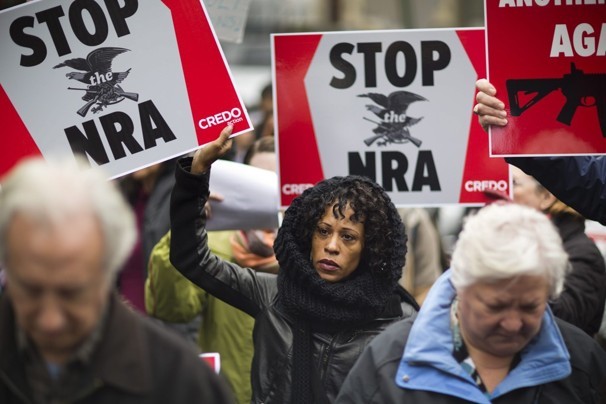[NOTE: The author of this op-ed, Heartland Institute Senior Fellow for Legal Affairs Maureen Martin, died in a housefire on February 5, 2013. This was one of the last op-eds Martin wrote before the tragedy. — Jim Lakely, Director of Communications, The Heartland Institute.]
Why do antigun activists target guns lawfully owned by private citizens, rather than seeking real solutions that actually work?
There’s a combination of reasons.
Some people believe only government can solve social problems. Remember Julia, the young woman in the Obama campaign video who depended on government assistance from cradle to grave? That’s the model, and any measure increasing dependence on government is considered good public policy.
Progressives instinctively turn to government. There is a certain laziness in this, to be sure. Before President Johnson’s 1965 War on Poverty, there was widespread acknowledgment this country had hard work ahead of it to ensure black Americans caught up economically. The War on Poverty took people off the hook insofar as individual action was concerned. The government could simply throw money at these problems and solve them. That hasn’t worked, but the mentality remains.
Second, shooting guns is not socially acceptable to the progressive elite. Obama reviles gun owners, calling them “bitter clingers” hanging on to their guns and religion. White rednecks, in other words. Progressive politicians and the media commonly express that attitude.
Third, progressives praise intent instead of results. Doing something cosmetic to solve a social problem is enough. Have the government do something, never mind whether it’s effective. Give a speech. Then take a bow.
Here’s an example. In 1991, Alex Kotlowitz, then a Wall Street Journal reporter, wrote a book, There Are No Children Here: The Story of Two Boys Growing Up in the Other America, about young African-American boys growing up in a Chicago public housing project. He concluded the boys had no future in the projects; their only hope was to escape, which he helped them do.
Later, Kotlowitz gave a stirring speech at the annual benefit for the leftist Legal Assistance Foundation of Chicago. He noted the boys’ only hope was a life outside the projects. After the speech, the organization announced it was suing the Chicago Housing Authority to force correction of building code violations at the project where the boys lived.
That’s not a bad thing. But what stunned me was the facial expressions of these good progressives as they left the luncheon—smug and self-satisfied. We’ve done good, they were saying. Naively, I was stunned and dismayed. We had just heard how futile and empty life in the projects was, but the luncheon attendees believed building code enforcement was a great accomplishment.
Fourth, progressive positions rest on emotion. I “feel” that limiting gun ownership will help curb gun violence. Feelings are never wrong; they inherently can’t be. No amount of factual rebuttal can defeat a feeling. There is no doubt increasing the number of guns held by private citizens means less crime, as John Lott established in his landmark book More Guns, Less Crime. And as I wrote in an amicus brief cited by the U.S. Supreme Court, Chicago’s ban on handguns led to substantial increases in gun murder rates in that city. Still, progressives want limits on gun ownership because they “feel” it is right.
The facts are that the nation’s gun violence problem is limited to two major areas.
First is gun violence in schools. The only way to meet this issue is to provide armed police and security guards in schools. All possible limits on gun ownership have failed to address this issue and will continue to do so. Nor can police possibly respond in time to prevent these killings. It took the police in Columbine 47 minutes to respond, and those in Newtown 20 minutes to get to the school. Eternities. In each case a dozen or more were dead before help arrived.
The second is gun violence on urban streets. In Chicago, for example, more than 500 young people were gunned down last year. Draconian gun laws have taken guns out of the hands of law-abiding citizens, but criminals are always able to get firearms.
These urban neighborhoods have very little private-sector economic activity and relatively few legitimate jobs, even though we’ve thrown half a trillion dollars—that’s trillion, not billion—at federal poverty programs each year during the Obama administration alone. And that doesn’t include state and local programs. Yet the poverty rate has remained about the same since President Johnson declared his War on Poverty. The government money flowing into these neighborhoods is clearly suppressing their economy. We have to have a frank discussion of what actually works in reducing poverty, not more empty gestures.
We have to instill hope in the minority children and young adults in our inner cities. Hope that if they forego easy drug money, decline to bear children out of wedlock, study hard in school, work hard, and defer gratification, they can succeed. Taking guns away from law-abiding people won’t save these lives. It’s just another easy feel-good gesture that will do much more harm than good.
Maureen Martin, J.D.was senior fellow for legal affairs at The Heartland Institute.




